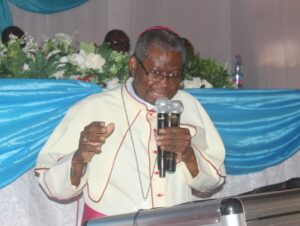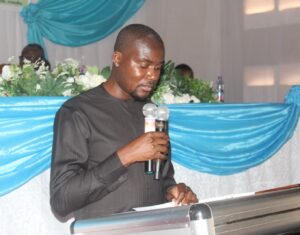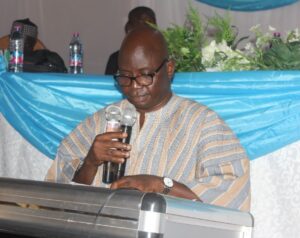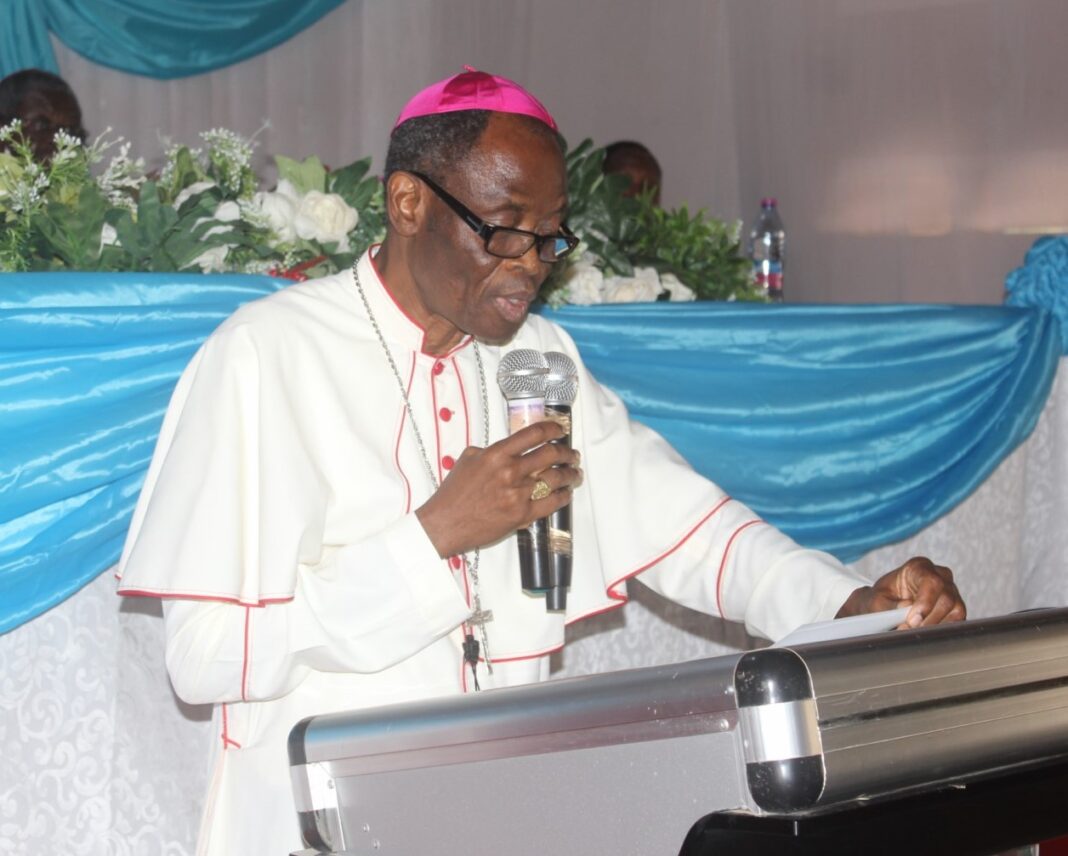The Bishop of Navrongo-Bolgatanga Diocese, the Most Rev. Alfred Agyenta, has stated that the Catholic Church’s message of universal fraternity and social friendship makes her a non-partisan player in the quest for peace and social cohesion given its proven record of excellent work in peace building around the world.
He stated this in his welcome address at the launch of the second phase of the Sahel Peace Initiative (SPI 2.0) at Bolgatanga on October 4, 2022. The SPI 2.0 is under the theme, “Restoring community life and peace in Ghana and the Sahel Region”.
Five counties namely Mali, Burkina Faso, Niger, Cote d’Ivoire and Ghana, are to benefit under the initiative which seeks to promote peace and social cohesion in the West Africa sub-region as well as support and strengthen the resilience of people most affected by the effects of conflicts and violence.
Catholic Relief Services (CRS), is to fund SPI 2.0 with an initial amount of USD 300,000 to be implemented within 18-months.
The goal of SPI 2.0 is to ensure that the Catholic Church in Ghana takes ownership and leadership in promoting peace and building a cohesive society to ensure that individuals living in Ghana experience greater levels of peace, social cohesion and resiliency.
It is being supported by the National Justice and Peace Commission, the National Catholic Secretariat (NCS) as the implementer of SPI 2.0 with Centre for Conflict Transformation and Peace Studies (CECOTAPS) of the Damongo Diocese and Navrongo-Bolgatanga Catholic Diocesan Development Organisation (NABOCADO), as the implementing partners.

Touching on the significance of SPI 2.0, Bishop Agyenta said its launch in the Upper East Region was no coincidence as the region was one in turmoil where violence and armed conflicts abound.
He said the region is presently not only vulnerable and severely exposed to external threats of violence and insecurity, but is also by default the first port of call for the displaced and traumatized people of neighbouring countries looking for a safe haven.
In this regard, he noted that the launch of the SPI 2.0 seeks to send a powerful prophetic message first of all to the people of the region that “anybody who takes the sword will die by the sword. Violence has never solved any problem in the history of humankind and will never ever do so today or in the future”, the Bishop added.
He said the launch was also a clarion call on government and the political leadership of the country to step up their responsibility to ensure that the coercive powers of the State that was vested in them to protect lives and properties of citizens were fully and effectively deployed in the region which he noted was “currently bleeding profusely”.
The Metropolitan Archbishop of Tamale, who also doubles as the Chairman of the Sahel Peace Initiative, the Most Rev. Philip Naameh, launched the initiative and appealed to government and the political leadership of the country to be committed to the common good.
He urged them to apply the resources of the country for the benefit of all, especially the youth to prevent them from being enticed by terrorist groups.
He said the Central Sahel region is currently experiencing an upsurge in violence due to increased extremism, weakened national institutions, and diminishing natural resources which has led to the migration of millions of people who have fled their homes, some of whom have sought shelter in Ghanaian communities and villages.

He said given the perception that governments in the Sahel region are failing to provide critical social services makes it imperative to collaborate with local communities and civil society, including religious leaders, to rebuild trust in local and national state institutions and rekindle civic participation.
The Archbishop lamented that 65-years after Ghana’s independence in our social discourse, some ethnic groups feel inferior because of the way they are treated while others see themselves as superior, which he argued does not foster social cohesion. He, therefore, advised Ghanaians to promote their multi-ethnic identity and the values that defines us as a people such as our hospitality, friendliness, peaceful nature and a welcoming attitude to outsiders to foster social cohesion amongst us.
Mr. Daniel Mumuni, Country Representative of CRS, said the launch of the SPI 2.0 reflected the strong partnership CRS and the Catholic Church in Ghana has built and sustained over the years. Recounting the history of the SPI, he explained that it was designed in 2019 by CRS in partnership with the Episcopal Conference of West Africa to address the unprecedented levels of violence in the Sahel region which he lamented has resulted in an astounding humanitarian crisis.
Giving statistics of the humanitarian crisis as a result of conflicts in the Sahel region, he said as of May 2022, the number of displaced persons had increased by 40% since 2021 to 2.4million, with women and children comprising more than 50% of those displaced.
He said even though Ghana is one of the few countries in the Sahel that has not experienced violent extremism in terms of jihadist attacks, the establishment of armed groups in the northern part of the country has allowed them to implement an active recruitment strategy.

Further to this, he said persistent conflicts in northern Ghana, clashes between the youth and security agencies as well as instances of police brutalities creates the heightened need for peace building in Ghana to avert a replication of the humanitarian crisis being witnessed in other parts of the Sahel region.
In his address, Mr. Stephen Yakubu, the Upper East Regional Minister expressed concern about the insecurity in the sub region which he noted makes it urgent for peace initiatives to help build the resilience of communities in neighbouring countries.
He said some border communities such as Sapeliga, Bansi and Getiga II in the Bawku West District, Binduri and Bawku Municipality respectively, have been inundated with immigrants from Burkina Faso and was therefore hopeful that SPI 2.0 would form part of a comprehensive support programme to address the needs of the immigrants and the people of the host communities.

As part of measures to secure the country, he said the government through the Ministry of Defence have established and equipped a number of Forward Operation Bases across our borders to enable the military swiftly respond to any external hostilities resulting from the activities of terrorist and extremist organisations in the Sahel region.
Speaking about the slogan, “See something say something” he said it was launched by government to sensitize the citizenry about the activities of terrorist groups. He also spoke about the conflicts in Bawku and between the people of Doba and Kandiga which he lamented has resulted in massive lost precious lives and properties.
The President of the Upper East Regional House, the Chiana Pio, Pe Dituudini Adiana Ayagitam III whose solidarity message was read on his behalf by Naba Sigri Bewong, Paramount Chief of Sakote Traditional Area, noted that peace is a sine qua non for development in all spheres of live. Hence, he promised that he and his colleagues would support pre-emptive measures that could occasion the breach of peace.
He also assured of their support and partnership with all stakeholders to create awareness on sustainable peace. He added that the House was working assiduously to address all land and chieftaincy conflicts in the region.
Alhaji Adam Mustapha Sheriff who represented the Regional Chief Imam, spoke about ills such as corruption, thievery and injustice bedeviling our society today where he said the rich and affluent are never wrong. He argued that such tendencies does not promote peace.
He commended the organisers for the choice and aptness of the theme and pledged that the Moslem leadership in the region would collaborate with their Christian counterparts to promote peace in their communities.
He used the opportunity to explain the true meaning of “Jihad” which according to him has been misinterpreted and therefore misunderstood. He said it is an Arabic word which means “to exert oneself” or better still, “to exert ones capability in the cause of Allah to do good”, stressing that it does not mean killing or violence.
Other messages were by Naba Atogumdeya Roland Akwara III, Sirigu Naba and Pognaa Alice Ayemga, the President of the Upper East Region Queen Mothers’ Association.
Mr. Rex Asanga, the Bolgatanga Municipal Chief Executive, Very Rev. Fr. Lazarus Anondee, Secretary General of the NCS, Major Errol Archer Donkoh, who represented the Commanding Officer of 11 Mechanised Battalion based at Bolgatanga, ASP David Fiako-Okyere, Public Relations Officer of the Upper East Regional Police Command and Professor Samson Abagale, National President of the Justice and Peace Commission, were among the dignitaries who graced the launch which was chaired by Mr. David Adeenze Kanga, a former Deputy Chairman of the Electoral Commission of Ghana in-charge of Finance and Administration.
Many other guests, Priests, the Religious and representatives of Justice and Peace Commissions from the Tamale Archdiocese, Navrongo-Bolgatanga, Wa, Damongo and Yendi Dioceses, were also present.
By Francis E. Monnie



